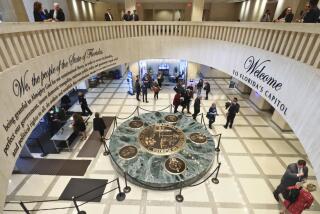Bill Would Track Foreigners’ Holdings
- Share via
The increased foreign investments--especially those by the Japanese--in prime U.S. commercial real estate have caused Rep. John Bryant (D-Tex.) to introduce a bill that would enable our government to keep track of the amount and kind of foreign investments being made.
Bryant believes that registration would enable analysts and realty professionals to document foreign investing by making businesses, individuals, governments and investing groups register if 5% of any American property is owned by a foreign person or group--whenever the market value exceeds $3 million.
Although Bryant and others recognize that foreign investing contributes some benefits to the U.S. economy, there is concern about influence of those investments and the security of U.S. economic independence. On the other hand, a spokesman for American real estate interests contends that foreign investors are a positive and necessary factor.
But what about the Japanese viewpoint? It is reported that Japanese investors are unhappy because of the inflationary effect of a severe shortage of usable land in Tokyo, which has resulted in land prices that are “inconceivable” by U.S. standards (up to about $12,000 a square foot), according to Nachiko Mogami, an executive with Bank of America in San Francisco.
He noted that anticipation of strong appreciation, particularly in the worth of the land, is so great that buyers pay atrocious prices even though current income on those properties is relatively small.
Mogami contends that Japanese developers and investors are mainly interested in central business district properties as long-term investments that can be used as collateral for other borrowing. In other words, buy the best commercial properties, hold them and take advantage of the appreciation. That sounds like old-fashioned American real estate philosophy.
Moreover, Mogami sees security of investment as the top priority of Japanese investors coming into the U.S. market. It is estimated they invested $5.5 billion here last year and the amount is expected to be higher this year.
Mogami notes that Japanese realty investors look for prime buildings in the central business areas of Mid-Manhattan, Los Angeles, San Francisco, Washington and Boston.
Are the Japanese careful about their U.S. investments? Mogami notes in a recent article in Urban Land magazine that “properties other than office buildings or those located in smaller cities are subject to meticulous committee scrutiny, while trophy properties such as the Exxon Building in Manhattan or Crocker Center in San Francisco can be quickly approved.”
The banking executive also explained that Japanese purchasers have the clout of cash because they usually get their financing in Japan--taking advantage of the leverage obtained by the soaring land and real estate prices in Tokyo.
Elsewhere on the U.S. realty scene:
Reduced migration from the Snow Belt to the Sun Belt has been reflected in new-housing activity, according to Andrew Lofgren of the National Assn. of Home Builders. He noted that the Northeast and Midwest have recently shown increasing strength while some parts of the South and West have been sluggish in comparison to the residential building pace of a few years ago.
He cautions that the change “does not suggest that the long-term trend of migration to the South and West will cease.” He’s really saying that improved economic conditions in the Northeast and Midwest could reduce net out-migration.
What about the effect of inflation on the $125,000 one-time income tax exclusion on gain of a principal residence house sale for persons over 55? This has proved to be a stimulus for the housing market and an attraction for well-to-do couples over 55 to move to a smaller, newer house or luxury apartment in which to spend their golden years.
Housing prices often reflect household incomes. That’s why housing prices in the nation’s capital are among the nation’s highest.
A recent survey made for the Washington Post showed the Washington area with the average after-tax household income of $47,273, followed by San Francisco-Oakland area, with $42,484, Boston with $41,506, Chicago with $39,083 and Los Angeles with $37,470.
More to Read
Inside the business of entertainment
The Wide Shot brings you news, analysis and insights on everything from streaming wars to production — and what it all means for the future.
You may occasionally receive promotional content from the Los Angeles Times.










